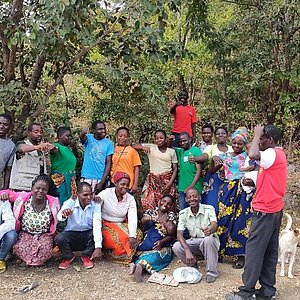Alliance for Restoration of Forest Ecosystems in Africa (AREECA)
Land degradation and loss of forests exacerbated by climate change and unsustainable land use practices in Africa threaten primarily the vital ecological functions of land, its productivity, food and water security. Poor resource governance, little access to innovation and resources and unfavorable policies prevent countries from bringing FLR to scale. The project thus aims at increasing the economic, ecological and climate-related benefits from large-scale FLR in the partner countries. The project will provide field support, capacity building and policy advice to restore FLR at ground level, unblock large-scale FLR, leverage resources for FLR, share FLR experiences and monitor FLR results. By establishing new carbon stocks and reducing pressure on existing ones, this project mitigates climate change, increases resilience and protects biodiversity.
- Countries
- Cameroon, Kenya, Malawi, Rwanda
- IKI funding
- 23,500,000.00 €
- Included preparation phase
- 509,162.49 €
- Duration
- 09/2019 till 12/2025
- Status
- open
- Implementing organisation
- Deutsche Gesellschaft für Internationale Zusammenarbeit (GIZ) GmbH
- Political Partner
-
- Ministry of Environment, Climate Change and Forestry (MECCF) - Kenya
- Ministry of Environment, Nature Protection and Sustainable Development (MINEPDED) - Cameroon
- Ministry of Environment - Rwanda
- Ministry of Environment and Forestry - Kenya*
- Ministry of Forestry and Wildlife - Cameroon
- Ministry of Natural Resources, Energy and Environment - Malawi
- Implementing Partner
-
- African Union Development Agency (AUDA-NEPAD)
- Food and Agriculture Organization of the United Nations (FAO)
- International Union for Conservation of Nature and Natural Resources (IUCN) - Eastern and Southern Africa Regional Office
- The World Bank Group
- World Resources Institute (WRI)
- World Wide Fund for Nature (WWF) - Germany
State of implementation/results
- AREECA has implemented restoration activities on 10,097 ha and is supporting further planning processes on 5.7 million ha.
- The project co-manages the Restoration Community on the PANORAMA Platform.
- AREECA supported the Restoration Academy Tanzania and 8th AFR100 Partnership Meeting in 06/2024.
- The World Bank held FLR Forums in Malawi and Kenya.
- AUDA-NEPAD launched the AFR100 Monitoring platform and held a monitoring workshop for AFR100 focal points. In addition, a communication workshop was held in 05/2024.
- The Land Accelerator commenced the 2023 cohort with 103 restoration enterprises from 27 countries. A new call for applications was launched in 01/2024.
- WRI disbursed $17.8 million in grants and loans via TerraFund to 92 community projects in three priority landscapes for restoration in AFR100.
- AREECA implemented restoration capacity trainings in Rwanda, Malawi and Kenya.
- Malawi:
- Farmer Field Schools have identified suitable soil fertility and climate resilient livelihood practices including conservation agriculture with trees (CAWT). A roadmap on harmonisation of policies has been completed. The district restoration plan for Ntcheu District has been instrumental in the district seeking more financial Resources for FLR from EU. New activities include grant application processes for private businesses reducing reliance on forest resources, irrigation scheme plans to increase climate change resilience and market access agreements for farmer groups. AREECA organised the first National Chiefs Forum on Improved Natural Resource Management in 2023 hosted by Malawi’s State President. Engagement between 75 chiefs is facilitated in 2024 to follow up on the Forum.
- Rwanda:
- The project focuses its activities on local participation and ownership schemes, as well as rehabilitation of forests, agroforestry schemes and roadside restoration measures. The Urban Forestry and Roadside Plantations Guideline was elaborated and approved as a guiding document to all restoration actors in Rwanda. In collaboration with RWARRI, the concept note for the Community Environmental Conservation Fund/Scheme was developed, discussed, and validated.
- Cameroon:
- In cooperation with the traditional authorities, an inventory on existing Sacred Forests (Forêts Sacrés) was conducted and nurseries focusing on autochthone species have been established. The agroforestry mobilization campaign started and the restoration monitoring capacity assessment has been completed. To complement landscape planning on communal level the approach of Local Conventions for Protection and Management of Natural Resources was agreed by partners. Activities implemented include anti-erosion measures, restoration of riverbanks and sacred forests, tree planting and agroforestry trainings.
- Kenya:
- A model tree nursery with a capacity of 1.3 million seedlings was launched in 11/2023 to boost the goal of the Kenyan government to plant 15 billion trees by 2032. In the last 6 months the project planted over 130,000 trees. Restoration of 150 ha of rangelands started in collaboration with JustDiggIt, ALOCA and Big Life Foundation. The Kajiado Bee Keeping Strategy and County Bee Keeper Union were launched in 05/2024. A local restoration funding mechanism was initiated.
Latest Update:
04/2025
Further links
Project relations
Legend:
The link has been copied to the clipboard







